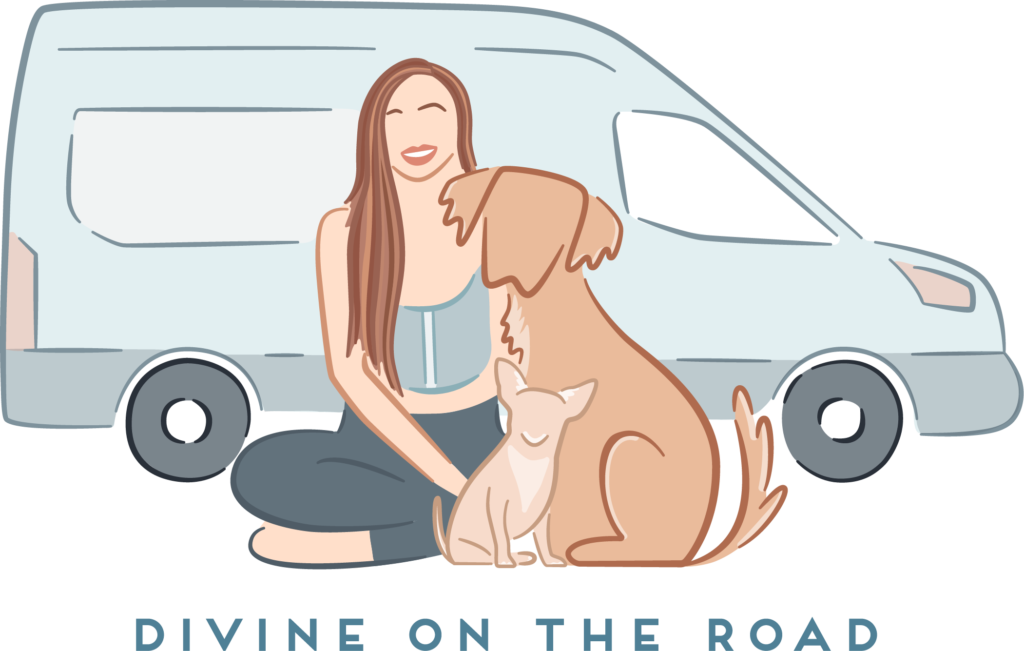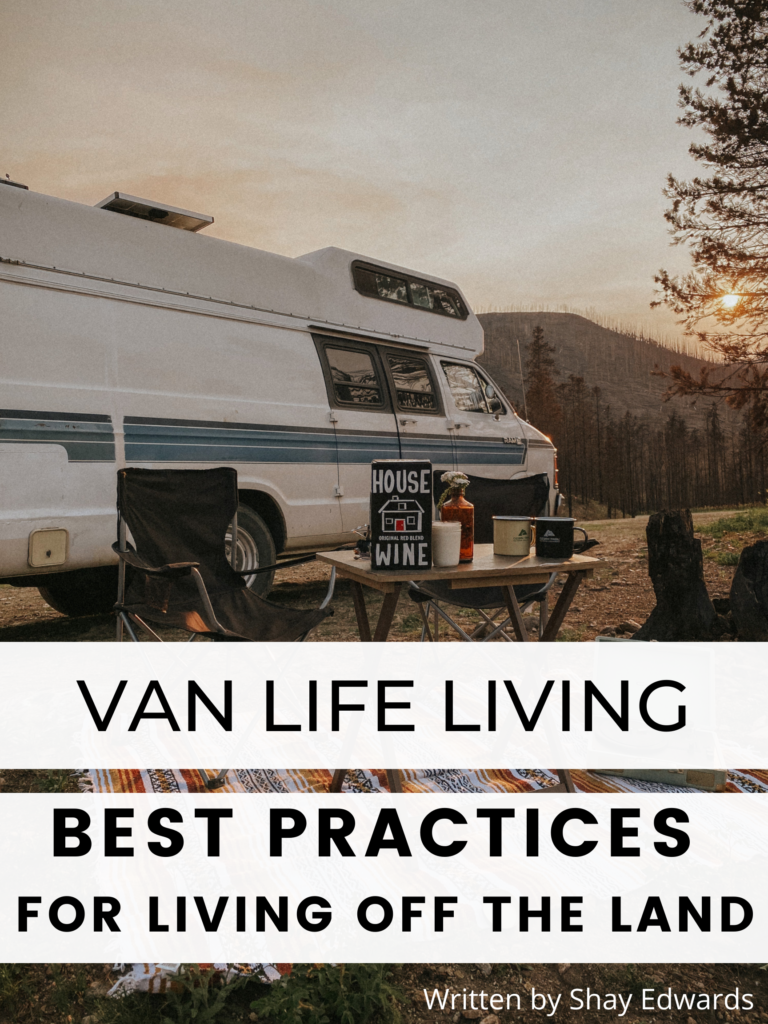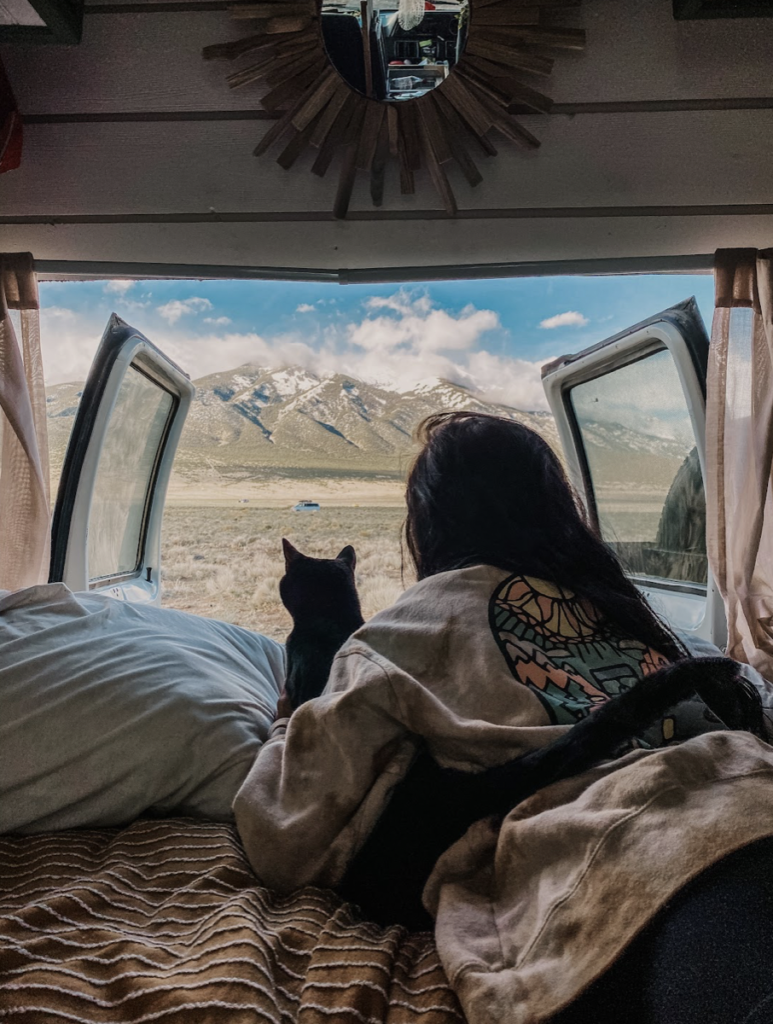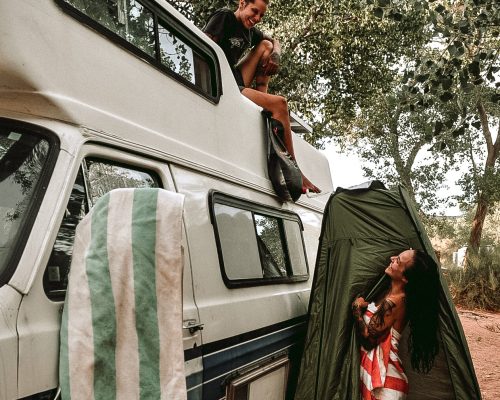Prior to Van Life, my partner Gene and I, had lived in the city of Philadelphia for years, working seven days a week just to be able to afford our overpriced rent and spend money on things we didn’t really need. All the while, our apartment was filling up with material items that didn’t actually spark any joy in us. As our rent was coming to an end, and we had to decide if we would renew for another year, we started talking about transitioning our life into an alternative style of living where we could use less and work with the resources of the land.
Our Transition Into Van Living
Transitioning to living on the road was more than saving on rent money for us, we made it a goal of ours to learn the ins and outs of a more simplistic way of living and how we could live off the land without leaving much of a trace at all. Below are some of our favorite ways we’ve noticed living out a van has helped us learn more about the environment and how to care for it while calling the land our home.
How We Choose Where to Park and Sleep
When we first started building out our van, we thought you could just pull up to any spot and call it home for the night. Pictures on social media can sometimes lead you to believe that there are little rules and regulations about where you can camp, stay, and drive, but there are actually a lot of things to keep in mind!
Our go-to app to find places we can stay in every area we’re in is iOverlander, but with tens of thousands of people using that app everyday, sometimes spots can be overcrowded and then suffer the consequences of too many people using them, which has caused tons of spots to be closed down or regulated to keep overnight sleepers away. Here’s what we look for in different climates:
- When We are in Desert Landscapes
- We stay at already-made campsites and areas of high rock volume. Deserts are the easiest to impact because the soil in the area is easily damaged and water is scarce.
- We only hike and explore on developed trails and don’t do any backcountry hikes or walks because the ground is easily damaged and has a hard time repairing itself even after one set a feet passes through it
- When We are in Mountain Landscapes
- We stay away from live vegetation when choosing where to park if we go to a remote place
- Park at least 200 feet away from water in case any trash/liquids are out of our van and could get swept into water supply
- Make sure to set up camp kitchen/chairs on areas with low vegetation, and clean up each night because wildlife is very prevalent in these areas
- In Cities/Towns
- It can be easy to fall into the pattern of always wanting to open your doors and treat every spot like a beautiful off-grid camp, but the trick to keeping stealth city spots available for overnight parking is to keep to yourself and respect the spot.
Black-out curtains or window covers are key to this, we use this brand and have never had a problem even when we have our lights on inside our van!
Waste on the Road
One of the biggest lessons we learned from moving out of traditional housing and into a van was just how much waste two people can produce. When you constantly have a trash service or a large trash can, it can be hard to notice just how much builds up each day. With a super small trash can like we have in our van paired with the extra effort it takes to dispose of it on the road, these are a few of our favorite tips for properly managing our waste in the van:
Trash Storage
- We store all trash that we can’t compost in large bags that we pack in and out of each camp spot and location we stay in so we can find proper receptacles to dispose of them later on. There are really great products that you can attach to the back of your van so you can carry your trash out of each spot without having to keep it all inside the actual build which we recently ordered!
- We have hooks on the side of our van, high enough from the ground, where we can properly store extra waste to make sure it won’t attract wildlife too close to people/camp
Recycling
- We try and purchase glass products when we can during food or product shopping, so we can later re-use the containers in different ways. I.e. cup, bowl, lotion bottle, tupperware, plant holder, etc
- If we must purchase plastic, aluminum, etc we use the Waste Management site to search the town/city we are in and find the nearby recycling centers. They will provide you with hours of operation and we just stop by on our way out of that town/city
- We also take time before we leave each camp spot to try and search the area to see if we can collect items left behind from other campers to either dispose of or recycle. You’d be surprised how many campers leave trash behind, which ultimately leads to spots being closed off for future use!
Compost
- Since moving into the van, we have been really focused on making composting a more important part of our daily life. When we food shop, we try and get food with the least amount of packing and waste, and if we have leftovers and scraps we have a large bin where we collect it all and then use an app called Share Waste to find a compost site in the area to drop it off at. Share Waste connects you with locals and businesses in the area who are already composting and they let you retrieve the address to come drop off your compostable scraps at their site. This is a great resource for anyone, not just nomadic people!
Bathroom and Showers on the Road
Going to the bathroom and showering in our van was one of the main topics that we truly had zero idea about. We knew we wanted a toilet in our build, but weren’t too sure how that would go as far as disposing of our waste later on. We also picked up a solar shower so we could shower off-grid when we weren’t around a Planet Fitness gym, but we had no idea that we couldn’t just pull that out wherever in nature. We learned so much from fellow vanlifers in our first few months on the road, and these are some of our favorites:
Toilets
- We have a Luggable Loo in our van with compostable bags that allow our waste to be broken down via a chemical mixture where we can then dispose of it safely after we’ve left an off-grid spot
- We also use Coconut Coir which breaks down and composts contents of our toilet, you can swap this out for cat litter as well!
- If we go outside we follow the following rules:
- Be 200 feet away from water
- Dig a cat hole around 8 inches deep
- Store any toilet paper you used in a separate bag to throw away later
- This keeps wildlife, camping pets, and vegetation the least disrupted by human company
Showers
- If we shower with natural water sources, we set up our solar shower more than 200 feet away from any water source.
- We collect water, place it in our solar bag, and warm it over time using the sun’s rays
- We use biodegradable soaps and lotions,with our favorite being Dr Bronners, but make sure to collect the runoff with our gray water tank because even biodegradable soaps can leave a trace in natural water sources
- We have started washing dishes using a spray bottle to limit overuse of water, and we also dispose of the dirty water later at labeled dump stations we find on an app called ioverlander
NATURAL ENERGY USE
One of the biggest perks of living out of a van, or any other vehicle, is your ability to always be traveling and not having to call one place home for too long. With that in mind, as more and more people hit the road full or part-time, that’s much more vehicle traffic in the world, which is harmful to the environment in the long run. We had so many great discussions about this topic with others, and these are some of the ways we limit our carbon-emissions the best we can while we live out a van:
We travel full-time with the temperature/climate at specific seasons. We do this for a number of reasons:
- We aim to stay around the 60-75 degree F point to limit our gas/power use on things such as Air Conditioning and Heating
- We power our battery bank in our van using solar energy which works best when we travel with warmer climates
- We have an awning to protect us from heat/sun where we can avoid using AC as well
There’s no perfect way to live or perfect way to exist as a human on this earth in general. We’re all just trying our best and constantly learning, so we love to share the tips and tricks we’ve learned with others because we wouldn’t be without others doing the same for us. A lot of the information and knowledge we’ve learned about proper land usage and management have come from the community of nomadic peers we’ve met since being on the road. If you have any other great tips regarding this topics, we’d love to read about them in the comments!

Shay Edwards
Author




I think van life is an interesting way to live and experience the world. It would be a challenge to give up my current lifestyle, but I can see the appeal of living a simpler life and being closer to nature. However, it is important to be aware of the challenges of van life, such as waste management and finding places to shower and use the bathroom. It is also important to respect the environment and leave no trace when camping.
I think this article is a great resource for anyone interested in learning more about van life. It provides a lot of practical information and advice, and it is clear that the author is passionate about this lifestyle.
This year, I have this amazing plan to turn my auto into the coziest mobile retreat. I’ve been enamored with Custom Van Conversions on social media, and I’m now experiencing a severe case of DIY project fever. The problem is, when I go more into the specifics, I’m certain that my van dream’s unsung heroes are the water tanks and lighting setups. It’s also encouraging that you mentioned that living out of a van—or any other kind of vehicle—allows you to move constantly and avoid settling down for extended periods of time.